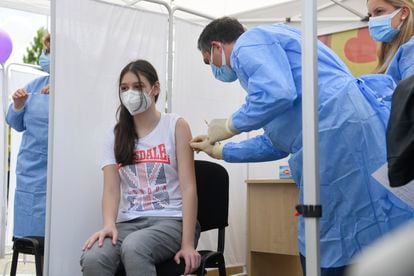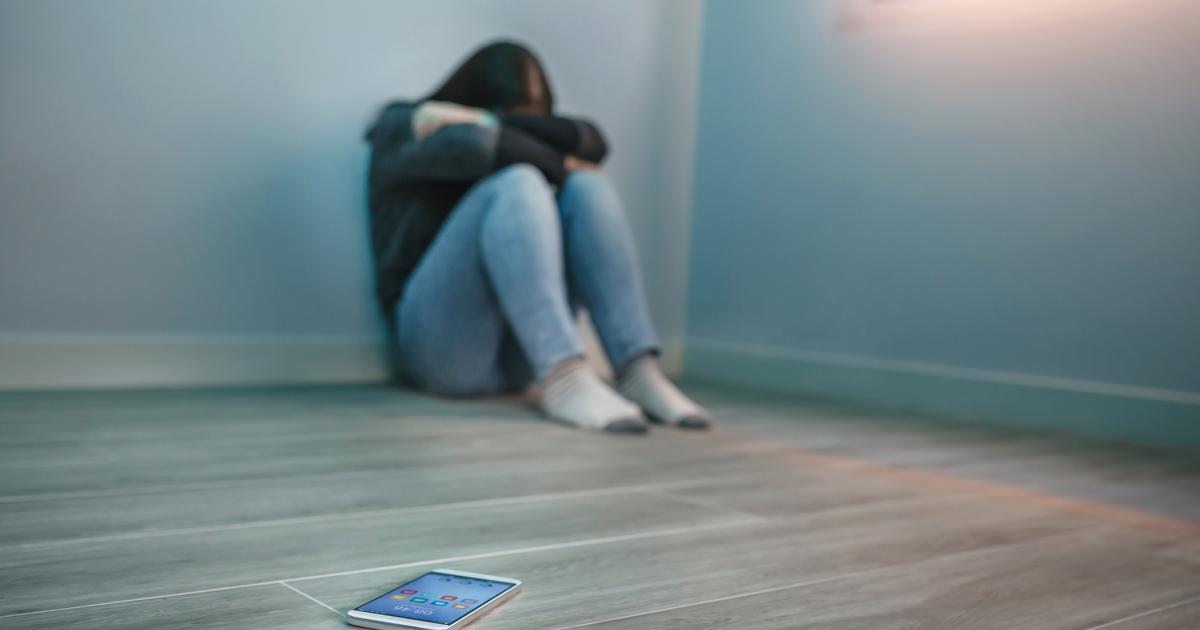Vaccination against covid in Spain has picked up cruising speed, with almost all of those over 60 years old with a dose and an accelerated rate of punctures in the groups of 40 and 50, and the Government has opened a new melon in the immunization strategy: he wants to puncture 12 to 17-year-olds before starting the school year. There are almost three million people, according to the National Institute of Statistics (INE). The European Medicines Agency (EMA) gave the green light last week to the Pfizer vaccine - until then endorsed only for those over 16 - for the age group 12 to 15 years and, according to the studies carried out, the effectiveness is of the 100%. However, the proposal of the Ministry of Health, which will raise the Public Health Commission to debate with the autonomies, opens a dilemma among experts:Epidemiologists and pediatricians question the relevance of vaccinating this age group, with a low risk of covid, when much of the world still does not have access to vaccines for its most vulnerable population.
More information
Large European countries begin to vaccinate without age restrictions
Adolescents enter the vaccination schedule: in a few weeks the most vulnerable and at the end of the summer the rest
How does Spain manage to keep schools open while everyone around it closes them?
This Friday, the Minister of Health, Carolina Darias, confirmed on TVE that the idea is to propose to the Public Health Commission that, approximately two weeks before the start of the school year, the inoculation of adolescents between 12 and 17 years old should begin . The minister has not given more details of how this group would be vaccinated, although the Catalan Government already advanced last weekend its intention to puncture this group in the institutes. Predictably, the injections will be, yes, with the Pfizer drug, which is the only one approved for now for this age group, although Moderna's drug is also under study by the regulatory authorities. In the latest update of the vaccination strategy, the Government already contemplated that, when the EMA endorsed the Pfizer vaccine for this age group,Communities could begin to puncture all those born in 2009 or earlier who had high-risk conditions, those who were large dependents or those who attended sheltered centers for people with intellectual disabilities or special education.
But beyond minors with a specific risk condition for covid, the mass vaccination of this group opens a debate among experts. Above all, because in epidemiological terms, this group is not the most contagious and, in addition, the risk of serious illness or death among adolescents is negligible: Health has reported about 409,000 cases among young people between 10 and 19 years of age since the end of the first alarm state. That is, 12% of the total reported cases. And, of them, only 0.5% had to be hospitalized, 132 ended up in the ICU and 13 died, according to the latest report from the Carlos III Health Institute. Pere Soler, head of Pediatric Infectious Diseases at the Vall d'Hebron Hospital in Barcelona, questions: “We must consider why we want to vaccinate them. From a public health point of view,children do not have a health emergency. Serious disease is very rare. And if you do it to stop transmission and increase group immunity, we have no data to tell us that vaccinating them is necessary. In Israel, for example, the decline in transmission is brutal only after vaccinating adults. .
Europe, however, continues to advance in its vaccination strategy and, now that a large part of its vulnerable population is protected, countries such as France, Germany and Italy are already beginning to lift age restrictions and open appointments for those over 12 years of age. Spain is immersed, for now, in vaccinating the 50 to 59 age group and second doses to the 60 age group, although some communities have already started with the 40 to 49 age group. Quique Bassat, pediatrician and epidemiologist at the Health Institute Global de Barcelona, affirms: “Vaccinating adolescents does not urge us, it is not a priority and we should not make that effort now. It is one thing to have vaccines for everyone, which would be favorable then, but right now, adolescents are little vulnerable to serious disease and contribute relatively little to community transmission:having them protected or not is not going to change the epidemiological situation ”. The epidemic curve follows a downward trend, although more moderate in recent days, and stands at 118 cases per 100,000 inhabitants in 14 days.
Vaccination of adolescents in Bucharest (Romania) on June 2.
Andreea Alexandru / AP
Spain is also one of the countries that has best organized their return to class this year.
According to the Ministry of Education, only 2% of the 380,000 classrooms were confined during the worst moments of the pandemic.
In fact, an OECD report placed Spain among the countries that missed the least days of school.
Denmark, Germany, Norway, Belgium, Holland, Ireland, the United Kingdom and France, among others, had to temporarily suspend their face-to-face classes.
“The schools have been open and they have not been major focuses.
We don't need vaccines to make schools safe, ”says Bassats.
Vaccinate the vulnerable
The experts consulted underline that, in a pandemic context, the priority is to vaccinate the vulnerable in all countries. Amós García, president of the Spanish Association of Vaccination, points out: “The more you vaccinate, the better. But we must make a reflection with another perspective: this is a pandemic and we cannot solve it with local recipes. The problem has to be solved in all countries, due to a question of social justice and the epidemiological impact, such as the appearance of new variants ”. The specialist maintains that the risk of new variants emerging among adolescents due to not being vaccinated is very low. Soler agrees: “Vaccines are not inexhaustible and you have to ask yourself if you vaccinate your teenagers or half the world that dies.The chances that there are new variants that escape vaccines are higher among adults in these countries than among our adolescents.
The lack of "equity" and the growing gap between rich and poor countries can have consequences when it comes to controlling the pandemic, they warn. Daniel López-Acuña, former Director of Emergencies at the World Health Organization (WHO), laments: “From an ethical, social and health point of view, the most vulnerable should be prioritized. But in real politics, that is not going to happen. The rich countries are going to vaccinate their adolescents first ”.
Epidemiologists insist that the epidemiological impact of vaccinating vulnerable adults in all countries is greater than that of prodding adolescents in rich countries. Bassat insists: “Once we reach 70% of the vaccinated population [the Government has set this goal for the end of August], the excess of vaccines I would not spend on vaccinating adolescents. Children can go back to school without vaccinations. Putting it on in June of next year would not change things. " The epidemiologist proposes "modeling the impact of vaccinating the adolescent population" to study whether this can reduce the transmission of the virus. “The impact will be small. Studies have been made of the impact that closing schools had in the first wave and it accounted for less than 5% of the weight of the containment of transmission ”, he adds.
Where the vaccination of adolescents will have an impact is in the dynamics of the classroom, since children could more easily make more flexible the use of the mask and other severe control measures, such as bubble groups, which are in the centers. Amos García replies, however, that the starting scenario for the next year, even without vaccinated high school students, will not be the same as last year. "With 70% of the rest of the population vaccinated, the scenario changes completely," he points out. Soler advocates waiting and seeing how the pandemic and vaccination in Spain evolve before starting to puncture adolescents: “With children you have to go from emergency to evidence. Vaccinating them is not a priority; it is a comfort ”.









